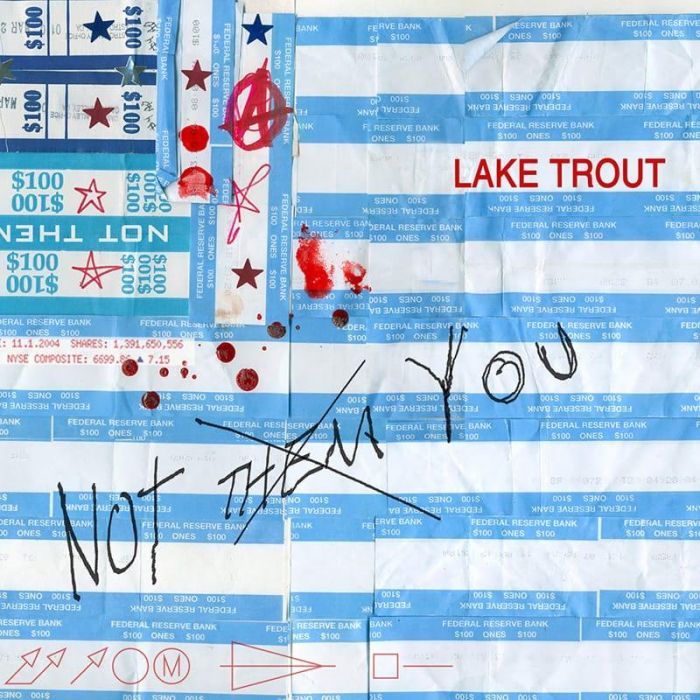Not Them You by Lake Trout (Review)

In hindsight, maybe it wasn’t too wise to listen to Not Them You while recovering from a paint-induced migraine (stupid home improvement projects!). It usually takes me a solid day to fully recover from a migraine, during which my perception can be a little on the discombobulated side. But there I was, draped over the easy chair with Lake Trout’s latest blasting over the speakers. And at that point, Not Them You was the biggest-sounding record I’d heard all year.
Of course, after a second or third listen, that particular impression had faded somewhat (due to a slightly less addled consciousness on my part). However, the disc is still a very “big” recording in terms of sonic scope. Again, as I did with my review of Lake Trout’s last disc, 2003’s Another One Lost, I find myself reaching for Radiohead as the first and most obvious touchstone for Lake Trout’s ambition.
Lake Trout doesn’t have Thom Yorke’s despairing wail — though vocalist Woody Ranere comes close from time to time. However, they exhibit the same penchant for layering atmospherics, finding intriguing ways to utilize the tried and true guitar/bass/drum trio, and incorporating different genres (shoegazer, downtempo) in ways that don’t feel like simple mimicry.
Although the label “jam band” has been attached to Lake Trout throughout their existence, that feels like a complete misnomer here. Unless, that is, you’re referring to the band’s sense of flow and willingness to layer sounds in a manner that could only have arisen out of hours of noodling, experimenting, and, well, jamming.
Unfortunately, the disc is hamstrung somewhat by three factors. First of all, Ranere just isn’t a terribly great lyricist. His words are passable, but they don’t often match up to the scope of the music surrounding them. In this day and age, it shouldn’t be too surprising that the band has a song or two condemning the current administration. But it’s done only in the broadest strokes (“So many locks on my doors/Afraid of colors now/Which one is war/The captain’s gone crazy/Can someone stop him maybe” — “Forward March”). Elsewhere, the band comments on materialism and consumerism in a similar manner (“Have You Ever”), their existentialist questions feeling a little thin (“Are we here/Just today/Not much time/To get it right/If we listen/We will know and start today”).
Second, several short musical interludes are sprinkled in between the songs proper. While that does lend the album some interesting sonic texture — the title track adds a nice DJ Shadow-ish downtempo vibe — they also slow down and derail the album’s aggressive pace. This is especially true in the closing minutes. Rather than leave well enough alone, the album fades out with mellow, slightly haunting instrumental “Keep Your Eyes Shut,” which feels somewhat anticlimactic considering the album should’ve ended with the mellow, slightly haunting “Honey” (which, as a bonus, features Ranere’s arching, breathy vocals).
And finally, there’s the band’s touted cover of the Rolling Stones’ “Street Fightin’ Man.” In and of itself, it’s not a bad cover (it ranks just below Passafist’s, IMHO), touched with the watery electronics and orchestral flourishes that we’ve come to expect from producer Dave Fridmann. However, it feels completely out of step with Not Them You, featuring a lighter, more ethereal touch than the rest of the Tony Doogan-produced album. Originally released as a 7″ single, methinks it probably should have remained that way.
But now that all of that’s out of the way, we can concentrate on the good stuff, of which there is a fair amount. I’ve alluded to this already, but one thing that gets me about this album is just how aggressive it is. This is largely due to Michael Lowry’s drums, which crash and roll through nearly every song, even slower ballad types like “Systematic Self.”
At times, the album gets a little too aggressive, almost achieving an aggro/industrial tone at times (I hope I’m not the only one who hears touches of Under Midnight on “Riddle” and “Have You Ever”). However, some element is often introduced to temper and reign things in a bit, be it a trilling flute passage, a shoegazer break, Ranere’s questing voice, or some combination thereof.
“If I Can” is one of the album’s strongest tracks, and features one of Ranere’s more affecting vocal/lyric combinations. As Ranere achingly sings “Tell me we’re not all going down in flames/Tell me it’s the same when we were young/We were strong/And all we needed is just one more song,” the rest of the band explodes at key points, punctuating Ranere’s questioning with crashing drums, surging guitars, and choral voices.
“King” creeps along on plucked guitars while Ranere adopts a slightly lower vocal stance, as lonesome flutes and pianos drift by in the background. The effect is similar to the lush, atmospheric pop of The Great Depression (another sadly unknown alt-rock band). And finally, “Systematic Self” moves from distorted drum programs and daydream-y synth textures to a soaring crescendo of glittering guitars and Ranere’s lofty falsetto.
It’s one of the album’s most Radiohead-like moments, but that doesn’t diminish it’s own loveliness one bit. Indeed, moments like these find Lake Trout shattering through the obvious comparisons, attaining a lofty sound all their own that leaves their better-known peers blinking in the aftermath, unsure of what just happened.